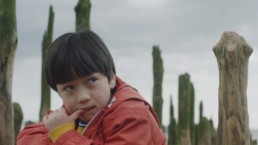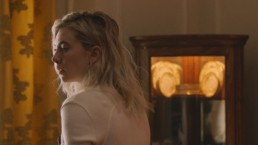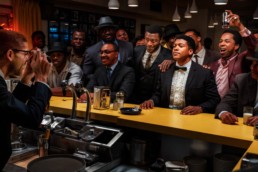'The Reason I Jump' Review: Celebrating the Beauty of Differentness
The ability to effectively communicate through words is something that comes so naturally to most of us that we don't even have to think about it. From early childhood, it's reinforced that if we want something, we need to ask for it. But imagine for a moment, that the words you want to say can't escape your throat. Instead, they bounce around your mind like a ping pong ball in a match that you can't win.
That's the reality for nonspeaking autistic people, whose struggle is seen in director Jerry Rothwell's intimate documentary The Reason I Jump. Based on the best-selling book written by 13-year-old autistic teen Naoki Higashida, The Reason I Jump profiles incredible young adults from around the world who prove that they are so much more than just a label.
For too long, being "different" has been seen as a problem in our society. Through interviews with five autistic people and their families, they show how beautiful it is to feel so much. Trying to exist in an overstimulated world can be extremely overwhelming at times, which is why many in the documentary have turned to the arts (or jumping on a trampoline) to express themselves. Innate attention to detail adds a unique depth to their understanding of natural sounds and art and the results are humbling and joyous.
Of course, this beautiful view of the world is not without daily hardships. Many in the film express how uncomfortable it is to feel like a prisoner trapped in your own body, a feeling that I can't even begin to comprehend. For some, their concept of time is scrambled. One young boy's parent describes his memory as a pool instead of being chronological or in a linear fashion. For example, running through sprinklers as a toddler feels just as familiar and recent as celebrating a 16th birthday.
Winner of the World Cinema Documentary audience award at the 2020 Sundance Film Festival, The Reason I Jump is a modest yet inspiring watch, offering a new perspective in our continuous quest for total inclusivity.
Distributed by Kino Lorber. Opening at Laemmle Virtual Cinema on Friday, January 8, 2021.
'Pieces of a Woman' Review: An Aching Portrayal of Grief
Between the emotional rollercoaster of that nearly 30-minute one take and Vanessa Kirby's sensational performance, Pieces of a Woman is mesmerizing cinema through and through. Award-winning Hungarian director Kornél Mundruczó, who last shook me to my core with the politically charged dog-based drama White God, presents a skillfully-crafted observation of a woman regaining control of her life after a traumatic loss.
Before diving in, I feel the need to note that this film and its portrayal of infant death could be triggering.
The film takes place in Boston, mid-September. Young couple Martha (Vanessa Kirby) and Sean (Shia LaBeouf) anticipate their daughter's arrival; looking at minivans, decorating the nursery, and preparing for the home birth are just some of the tasks left to accomplish before welcoming their baby girl. They could never have imagined that the future they so joyously mapped out was charting drastically off course.
Despite frantic attempts to resuscitate the fastly-declining newborn, the couple's midwife Eva (Molly Parker) is unable to save the baby in what can only be described as a fluke. It's an unexpected shock for everyone, most of all for Martha, who expresses her heartache, anger, and apathy in various ways. This stillbirth has not only stolen her future, but it also stalls her relationship with Sean and presents personal challenges she must face head-on to move on.
As humans, we try to find (or create) answers to problems to justify why bad things happen to good people. It's easier to comprehend bad news if we feel like there is a reason for it; we flounder in uncertainty. This psychological dilemma is seen when blame is immediately placed on Eva, despite the very plausible possibility of the baby's death being of natural causes. Instead of picking out car seats, Martha is picking out headstones, a reality that her mother Elizabeth (Ellen Burstyn) will not accept. One scene-stealing monologue, where Elizabeth chokes back tears of anger and remorse, is the definition of heartbreaking. Although she comes from a place of love, her overbearingness only frustrates Martha more. Elizabeth wants to take Martha's pain away but doesn't realize that her overprotectiveness is only making the pain worse.
The 24-minute, uninterrupted home birth scene... This one-shot is impeccable, the choreography is both fluid and chaotic, and I found myself holding my breath in anticipation of what was to come.
Written by Kata Wéber and executive produced by Martin Scorsese, Mundruczó's Pieces of a Woman is a performance-driven tour de force. The film consists of small details that create a tsunami of emotional catharsis. The result is a raw glimpse at the physical and psychological after-effects of a loss that is rarely portrayed onscreen. Martha is a layered character who isn't always likable as she goes through her grieving process. She becomes emotionally reckless, detached, and selfish, but we never feel compelled to villanize her. Here, Mundruczó shows there is no right way to grieve, and Vanessa Kirby's embodiment of a shattered woman trying to put the pieces together is powerful.
Now, the scene you've probably heard about: The 24-minute, uninterrupted home birth scene. This one-shot is impeccable, the choreography is both fluid and chaotic, and I found myself holding my breath in anticipation of what was to come. Kirby and Parker's dynamic in this scene is the epitome of feminine strength and is by far the most unforgettable scene in the whole film. Personal controversy aside, Shia LaBeouf gives an expectedly herculean performance as Sean. However, it's difficult to separate the art from the artist, especially when he gets sexually aggressive, physically abusive, and verbally degrading towards Martha.
In addition to the top-billed cast, appearances by Benny Safdie, Sarah Snook, and Jimmie Fails are fun surprises. Complementing the onscreen visuals is Howard Shore's score, whose composition of light piano strokes and harmonic vocals play like a baby's lullaby.
Kornél Mundruczó once again doesn't shy away from the reality of human existence. It can be gritty and hard and unfair, but life will only beat you down if you let it. Pieces of a Woman shows that resilience is the only way forward, and there is light just on the other side of the darkness.
Distributed by Netflix, Pieces of a Woman is available to stream on Thursday, January 7, 2021.
'One Night in Miami' Review: When Four Towering Figures Came Together
This seems to be the year of turning historically significant stage plays into strong feature films, and I am here for it. Hot off the heels of Netflix's homage to the "Mother of the Blues," Ma Rainey's Black Bottom, comes the Amazon Original One Night in Miami, a dazzling interpretation of Kemp Powers' play about the infamous night four formidable figures spent together, passionately discussing race, religion, and philosophy through monologues and music.
Miami, 1964. Friends gather to celebrate a surprising post-victory win for Cassius Clay aka Muhammad Ali (Eli Goree), the underdog who was all but guaranteed to lose his fight against heavyweight champion Sonny Liston. Reveling in glory and fame, Cassius is quickly humbled when his friends arrive at his hotel room– a room he was forced to book because Jim Crow-era segregation laws wouldn't allow him to stay in Miami Beach. Over the course of one night, Cassius and his friends, activist Malcolm X (Kingsley Ben-Adir), singer Sam Cooke (Leslie Odom Jr.), and football star Jim Brown (Aldis Hodge) passionately talk about their roles as leaders in the Black Power Movement and how they can better represent their community on the streets, on the stage, on the field, and in the ring.
While One Night in Miami is a fictitious account, it doesn't negate the fact that the brotherly bond shared between these four icons was monumental...
Proving that her creative talents extend far beyond her on-screen performances, first-time filmmaker Regina King delivers a solid directorial debut in One Night in Miami. Granted, the shooting script is pretty straight forward with most of the filming taking place in one room over one night, but she has the thespian's golden touch when it comes to coaxing the best performances out of her actors. Kingsley Ben-Adir's passionate monologues as Malcolm X will shake you to your core, and Leslie Odom Jr.'s soulful rendition of Sam Cooke's "A Change is Gonna Come" will cause the hairs on the back of your neck to stand up straight.
Watching this interpretation of how four of the original Black Power Movement influencers could have spent that infamous night is incredibly inspiring. While One Night in Miami is a fictitious account, it doesn't negate the fact that the brotherly bond shared between these four icons was monumental, both that night and evermore.
Distributed by Amazon Studios, One Night in Miami is in select theaters on Friday, December 25, 2020. Coming to Amazon Prime Video on January 15, 2021.
'Promising Young Woman' Is a Twisty Tale of Female Revenge
It was the haunting orchestral arrangement of Britney Spears's "Toxic" that did it for me; I knew at that moment that Promising Young Woman was something special. Both a cautionary tale about the dark side of bro culture and how repressed trauma can turn into boiling vengeance, Promising Young Woman tackles a sensitive conversation with sprinkles of irreproachable charm to create an intoxicatingly dark comedy.
Not all superheroes wear capes. In this case, it's just pink lipstick. When Cassandra (Carey Mulligan)–a once aspiring medical student– isn't working behind the bar at the local coffee shop, she's living a double life as a single, helpless frequenter of dive bars and nightclubs. Much to the surprise of the pervy men who try to take advantage of her in her drunken state, Cassandra's disheveled appearance and slurred speech aren't the results of too much liquor. This is all an act; sober as a judge, Cassandra gets men to their most vulnerable before unveiling herself as a fully functioning feminist who highjacks the night by teaching these men a valuable (and sometimes violent) lesson about their ignorance of rape culture.
But why go through all of this trouble every night? It's clear that she gets some satisfaction from teaching these creeps how to treat a woman with decency and respect, but Cassandra doesn't bear this cross for herself; her justification is something she keeps close to the vest. As she continues to go through the motions of her "questionable" daily routine, Cassandra hesitantly entertains a real relationship with her old medical school classmate Ryan (Bo Burnham), a sweet guy who seems like the perfect complement to her introverted self. However, his re-emergence in her life brings up a traumatizing event from her med school days which reignites Cassandra's deep-rooted desire for revenge, making her double down on her savage antics in an attempt at retroactive retribution.
Under Promising Young Woman's poppy bubblegum surface is a story so dark and twisted, it makes Nurse Ratched look tame. Director Emerald Fennell's genre-blending world finds the right balance between entertaining romantic comedy and horrifying revenge thriller, which is even more impressive considering it's her feature film debut. Also doubling as the screenwriter, Fennell's confidence in creating a story so sensitive yet relevant in today's dating culture and #MeToo movement is an unforgettable cinematic experience. Carey Mulligan's Cassandra is an untraditional heroine. She's quiet, cold, and suffers from mental anxiety, yet her determination to rid the world of misogynists is admirable. She is a flawed individual with pure intentions, the underdog of her own story, but not for long.
Bursting with wall-to-wall vibrance and violence, Fennell & Co have created a gritty tale of revenge in the modern age. Phenomenal performances aside, also worth noting is the film's soundtrack which is exclusively made up of female artists, including Paris Hilton's infamous debut single "Stars Are Blind." If there's a succinct message to take away from Promising Young Woman it would be this: don't underestimate the strength of a woman, quiet doesn't equal weakness, and you can always count on an ex-nursing student to give offenders a taste of their own medicine.
Distributed by Focus Features, Promising Young Woman is playing in select theaters on Friday, December 25, 2020. Coming soon to VOD.
'Luz: The Flower of Evil' Review: A Mesmerizing Faith-Based Fever Dream
When the press release for Luz: The Flower of Evil popped up in my email, my jaw dropped. A quick scan through the beautiful images led me to the film's description: "The Witch meets Jodorowsky’s El Topo meets The Sound of Music landscapes and with a sort of Terrence Malick tone..." Whatever this movie was, I knew I had to see it for myself. This was either going to be the biggest cinematic accomplishment of all time or a total letdown.
Director Juan Diego Escobar Alzate delivers a visual feast in this trippy fever dream, where good battles evil in an overly saturated mountain town. Alzate's highly-ambitious fantasy horror film may sound like an explosion of genres-which it is- but it's one of the most unique and bold expressions from a filmmaker I've seen recently.
Blurring the lines between heaven and hell, the leader of a small religious cult reigns over his community. El Señor (Conrado Osorio) is an overly protective, single father of three girls Uma (Yuri Vargas), Laila (Andrea Esquivel), and Zion (Sharon Guzman), and considers his word to be gospel. One night, he returns to his mountainous village with a young blonde-haired, blue-eyed boy who he claims to be the new Messiah. But not everyone believes this child is the second coming of Christ, especially when death and destruction suddenly befall El Señor's own family. This causes his daughters to question the existence of God and the dangers of their blind faith.
It's gory and graphic and, yes, there is a demonic goat, but Luz: The Flower of Evil is more than just shock value antics.
The desire for freedom lies at the heart of Luz: The Flower of Evil. For El Señor's daughters, they long to be able to make their own choices regarding their faith, their hobbies, and their budding sexuality. It's only when freeing themselves of the societal religious chains they proclaim, "by letting go of Jesus, I finally understood the true meaning of God."
In this incredible trip to heaven and hell, Alzate is ultimately showing the duality of mankind. We as humans are all part good and part evil, much like how some religions preach that God and the devil co-exist. The imagery that goes along with this message is nothing short of inspiring, every scene has a beautiful composition and texture. Kudos to the colorist Felipe Martinez and color grading company We Make Color for creating such aesthetically rich and unforgettable visuals.
It's gory and graphic and, yes, there is a demonic goat, but Luz: The Flower of Evil is more than just shock value antics. It carries a powerful message of unnecessary harm we endure due to manmade problems. Much like Nomadland's take on the power of the natural world's restorative healing capabilities, this film reminds us that nature doesn't cause pain. Appreciate miracles, don't go chasing them. And always remember that harmony brings peace and light. After playing in 34 festivals and winning 14 awards, Luz: The Flower of Evil is finally available to stream on Shudder next Monday, December 21st.
'Nomadland' Review: A Fresh Look at the Evasive American Dream
It takes a truly magical film to transcend its onscreen presence and hibernate inside your soul. That may sound lofty but since I first saw Nomadland, I haven't stopped reflecting on its gorgeous interpretation of alternative Americana living. Not only have I reveled in the beauty of the vast desert plains and saturated sunsets, but I'm finding myself meditating on the film's larger rhetorical question: what does it mean to feel "whole"?
Nomadland is no accidental knockout. With technical skill, a creative vision, and collaboration with some of the most respected artists in the game, director Chloé Zhao's third feature film is a love letter to nature's restorative energy and to the pioneers who brave their own trails
Set against a backdrop of economic hardship and an unsteady future, Fern (Frances McDormand) perseveres. She is a prideful woman who-despite losing her husband and more recently, her house and steady employment–accepts no handouts or sympathy. Seasonal gigs and living out of her camper van (named Vanguard) support a minimalist, albeit lonely, lifestyle. She quickly becomes intrigued by a community gathering of like-minded people and it's not long until Fern integrates herself into their tribe, which kick-starts her exploration into living among nature and discovering her holistic identity.
Compared to her new friends Linda May, Swankie, and Bob Wells (who are, in fact, real-life nomads) Fern is a "beginner nomad." She quickly adapts to life on the road as a single, middle-aged woman, constantly saying hello and goodbye to the strangers and friends she sees on her open-ended journey around the American West.
Throughout her time on the road, Fern gains independence from self and from society. Her life is atypical from most, a criticism echoed by her suburban-dwelling brother-in-law, but at this point in Fern's life, the stagnation of daily routines isn't her priority. Becoming more and more reflective and honest about what she wants out of life, Fern begins to find her peace. Her peace doesn't look like the pre-packaged "American Dream" that we've all been told to strive for, but it's aspirational nonetheless. A life of new experiences, a smorgasbord of interactions with various characters, and the opportunity to chart her own path offer simplicity and contentedness that a traditional life never could.
The character of Fern could only be brought to life by Frances McDormand, whose natural charm and undeniable talent are channeled in a steadily sentimental manner. Director Chloé Zhao and McDormand bring out the best in each other, creating something so pure like a perfectly in-tune duet. Visually, Nomadland is breathtaking. The poster alone gives a perfect peek into the film's peaceful warmness; you can almost feel the desert breeze sweeping across your face. Accompanying this rich aesthetic is the piano-centric score from composer Ludovico Einaudi, whose emotionally charged composition adds another element of nostalgia.
Nomadland humbly feels larger-than-life, observing man and nature in symbiotic harmony. It encourages us to look inward and examine where we can be more fulfilled, remembering to waste no time because life is short.
What makes you happy? Great. Now, do that thing.
'Wolfwalkers' Review: A Visually and Spiritually Spellbinding Tale
I'm calling it now: Wolfwalkers will take home the Academy Award for Best Animated Film.
Even though I sit here manifesting a win for a film that turned out to be a breakout hit during this year's unusual film festival landscape, Wolfwalkers most likely won't need any metaphysical help from me to be recognized by even more critics and audiences alike.
Directed by Tomm Moore and Ross Stewart, the film is a reimagining of an Irish folklore tale about the mythical creatures called Wolfwalkers. These half-human/half-wolf hybrids have special powers that allow them to communicate with–as well as transform into– wolves when their human form falls asleep.
Wolfwalkers, however, are feared by the townspeople of Kilkenny, Ireland, which is where our film's young heroine, Robyn (Honor Kneafsey) lives with her father. As the town’s newly appointed head wolf hunter, Robyn’s father commits to conquering more land for the King by ridding the surrounding forest of the beasts. One day, defiantly ignoring her father's orders to stay home and out of trouble, Robyn enters the forest armed with her bow & arrow, determined to prove that she has what it takes to hunt these problematic creatures, too.
An unexpected kerfuffle leads to an encounter with a young Wolfwalker, Mebh Óg MacTíre (Eva Whittaker), and Robyn ends up bonding with, rather than capturing, the forest-dweller. Mebh, a free-spirit with bright red hair and an even louder personality, introduces Robyn to her enchanting world–the world of the Wolfwalker (in a beautifully choreographed scene set to the film's anthem, "Running With The Wolves" by Norwegian singer-songwriter AURORA).
Touching on topics like deforestation, man vs nature, and spirituality, the film puts a child-like filter on the very real and very mature situations happening around us today.
A beautiful friendship develops; secrets are shared and vulnerabilities are embraced. Robyn has never felt more seen, but this forces her to make a decision. Torn between her judgmental upbringing towards the forest creatures and her loyalty to save Mebh and the wolves, Robyn must decide if protecting her newfound tribe is worth losing her father's respect and trust for good.
Wolfwalkers, the latest film from award-winning studio Cartoon Saloon, has a darker undertone than the typical “cartoon." Touching on topics like deforestation, man vs. nature, and spirituality, the film puts a child-like filter over a mature world that is very much happening around us today.
Technology and A.I. continue to push the creative boundaries of animated filmmaking (just take a look at the dazzling illumination in Netflix's Over the Moon, whose 3D-animated lighting is a skilled achievement). But to me, there is no replacing the beauty of a hand-drawn world–whose every line rings intentional and heartfelt–and which Wolkfwakers showcases magnificently.
Perhaps the purest of the film's intentions, however, is the belief that we all have a wild spirit animal inside of us, which can only be accessed when in tune with the natural world. Wolfwalkers is an entertaining hour and a half, sure; but its commentary on compassion, environmentalism, and genuine friendship is the film's greatest gift.
Distributed by AppleTV+, 'Wolfwalkers' is available to watch on Apple TV+ this Friday, 12/11.
'Wander Darkly,' A Pseudo-Surrealist Drama About Life and Death
Wander Darkly first came onto my radar at this year's Sundance Film Festival after interviewing composer, Alex Weston. His description of the film's artful intention and bold direction definitely piqued my interest. After bouncing around film festivals, the latest showing being at AFI FEST, Wander Darkly is finally making its way onto VOD this Friday.
Memories make us who we are; our personalities are, undoubtedly, shaped by our experiences. Without them, we're lost. This is what Adrienne (Sienna Miller) struggles to understand after a traumatic incident leaves her questioning everything she thought she knew.
Adrienne and her partner, Matteo (Diego Luna), have a lot to be thankful for. The recent birth of their daughter and their role as soon-to-be first-time homeowners is exciting, but a lot to process all at once. Emotions are heightened after a night out, and a petty argument puts Adrienne and Matteo on the verge of breaking up. Then, a life-changing tragedy strikes.
The effects are devastating, initially rendering Adrienne unconscious. When she finally comes to, albeit with a hazy memory, she is convinced that she died and is living in a purgatory-world. Unexplainably, Matteo is the only one who can see her and, in an effort to get Adrienne to remember her life and the life they shared, the two embark on a spiritual journey through timelines and special moments as they try to make sense of her alternate reality.
Opposite of Eternal Sunshine of the Spotless Mind, Adrienne and Matteo desperately try to retain the memories they have by encouraging each other to share the thoughts and feelings they were too afraid to say to each other years ago.
Like Adrienne, we're also caught in a grey area of blurred reality vs fantasy. She is simultaneously living through and processing her trauma by revisiting relationship milestones with a new perspective. Opposite of Eternal Sunshine of the Spotless Mind, Adrienne and Matteo desperately try to retain the memories they have by encouraging each other to share the thoughts and feelings they were too afraid to say to each other years ago.
Director Tara Miele's take on remembrance and spirit is something to be celebrated. She begs the audience to question what makes one "alive"– a conscious spirit or an unconscious body? Visually, Wander Darkly is stunning; every scene is wrapped in sun-soaked imagery like something out of a Terrence Malik film. Adding to the film's strength is Sienna Miller's devastatingly stark portrayal of a woman dying to be seen. Her pain is powerfully felt and her vulnerability makes for one remarkable performance.
Wander Darkly is an emotionally-charged trip through life's highs and lows. It also offers a poignant commentary that, although we are born and die alone, we don't feel so alone when sharing our life with those we love.
Distributed by Lionsgate, Wander Darkly is streaming on VOD on Friday, December 11, 2020.








